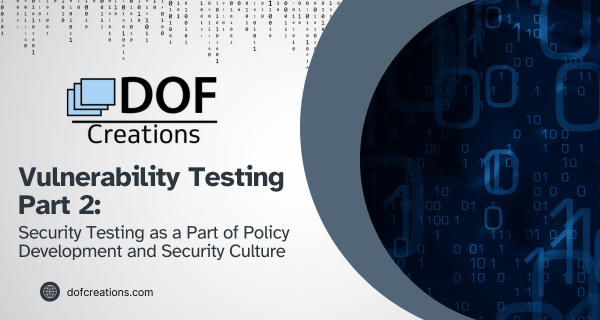Introduction
In a world where cyberattacks have become an everyday occurrence, it’s crucial for businesses to be proactive about their security. This means not just reacting to attacks when they happen but taking steps to prevent them in the first place.
One essential component of this proactive approach is vulnerability testing. In our previous blog, we provided an overview of vulnerability testing and its importance. In this article, we will delve deeper into the role of security testing in policy development and fostering a security culture within an organization.
Security Testing as a Part of Policy Development
Policy development is a critical aspect of any organization’s security posture. It involves creating a set of rules and guidelines that dictate how an organization will protect its assets, data, and network. Security testing plays a vital role in this process by helping to identify potential vulnerabilities and ensuring that the developed policies are effective in mitigating them.
Identifying vulnerabilities
Before any policy is created, it is essential to know what vulnerabilities exist in your system. Security testing helps in identifying these vulnerabilities by simulating cyberattacks and monitoring how your system responds. This gives you a clear picture of where your system is vulnerable and allows you to develop policies that address these specific weaknesses.
Policy validation
Once policies have been developed, they need to be tested to ensure they are effective. Security testing helps validate these policies by simulating attacks that target the identified vulnerabilities. If the policies are effective, the attacks will be unsuccessful. If not, it’s back to the drawing board to refine and update the policies.
Fostering a Security Culture
Creating a security culture within an organization is as important as developing effective policies. A security culture is a set of beliefs, attitudes, and behaviors shared by all members of an organization regarding the importance of protecting its assets, data, and network. Security testing plays a crucial role in fostering this culture by raising awareness about the vulnerabilities that exist in the system and the importance of addressing them.
Awareness
Regular security testing brings to light the vulnerabilities in the system, making everyone in the organization aware of the risks they face. This awareness is the first step towards creating a security culture as it motivates everyone to take security seriously and make it a priority.
Training and Education
Security testing not only identifies vulnerabilities but also provides an opportunity for training and education. Employees can be trained on how to respond to different types of attacks and educated about the best practices for protecting the organization’s assets, data, and network. This training and education are essential for fostering a security culture as it empowers employees to take an active role in protecting the organization.
DOF’s Thoughts
Security testing is a critical component of both policy development and fostering a security culture within an organization. It helps in identifying vulnerabilities, validating policies, raising awareness, and providing opportunities for training and education.
Together, these elements help in creating a proactive approach to security that can significantly reduce the risk of cyberattacks. If you need help with vulnerability testing or any other aspect of your organization’s security, contact DOF now. We have a team of experts ready to assist you in developing and implementing a comprehensive security strategy that strengthens your overall organization’s safety culture.



